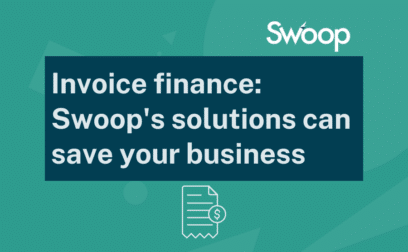TABLE OF CONTENTS
Page written by Michael David. Last reviewed on March 19, 2025. Next review due April 6, 2026.

If you want to smooth out your business cash flow, invoice factoring is a solution to consider. It can be one of the quickest ways to receive an injection of cash when you need it. Here’s what you need to know.
Many businesses find themselves in the position of having invoices that are owed to them but not enough cash in the bank when they need it. Invoice factoring refers to selling those unpaid invoices to a factoring company that provides you with cash immediately. You can think of invoice factoring as a cash advance for your businesses.
Invoice factoring has similarities to a short-term business loan, but it is really its own unique process. Here’s how it typically works:
Terry owns a property maintenance business and just billed a client for £20,000. He submits a copy of the invoice to his factoring company and they send him a £16,000 payment immediately, which is equal to 80% of the invoice. When the factoring company receives payment from the client a few weeks later, it deducts a 2% factoring fee, which works out to £400, and passes the remaining £3,600 to Terry.
In short, Terry agreed to be paid a total of £19,600 instead of £20,000 in exchange for receiving most of his money right away, which helped him pay the crew who worked on the job.
Managing cash flow is one of the greatest challenges of any business. Balancing the amount and timing of money coming in and money going out can be a constant challenge, and invoice factoring can help. Businesses choose this form of financing for several reasons, including:
When it comes to how the funds can be used, just think of all the potential applications for invoice factoring in your own business, such as:
Invoice factoring can be a way to access funds more quickly for just about any capital requirement you have in your business.
If you run a business that sends out invoices, as opposed to ringing up sales at a cash register, then you have a chance to apply for invoice factoring. Here are some of the things an invoice factoring company will look for:
Most business decisions involve trade-offs, and invoice factoring is no exception. Here’s a look at some of the pros and cons of invoice factoring.
One of the main alternatives to invoice factoring is called invoice financing. With invoice financing, you do not outsource the collection of your invoices to anyone else. Instead, you use your outstanding invoices as collateral for a secured loan. When you collect your invoices, you can repay the loan. Here are several other alternatives the invoice financing that you may wish to consider.
Compared to invoice factoring, a short-term business loan can be more difficult and time-consuming to obtain, but it offers you a lump sum of capital and the cost of borrowing is usually lower. You’ll be responsible for repaying the loan through regular instalments over a period of months or years.
Like invoice factoring, a business credit card can put spending power in your hand very quickly. However, they usually come with a high cost of borrowing and since you are only required to make a small minimum payment each month, it takes discipline to keep the balance under control.
A business line of credit is similar to a credit card in that it is “revolving” credit — meaning you are not required to pay it back in a fixed timeframe. However, if you are able to qualify, the cost of borrowing on a business line of credit is usually much lower than that of a credit card or invoice factoring.
A merchant cash advance has a lot in common with invoice factoring, but is generally designed for retail shops that do business at the cash register. You can receive a cash advance in exchange for a percentage of your credit card receipts until the loan is repaid with fees. Beware that these fees are typically quite high.
If you can find a small business grant offered by a government body or not-for-profit organisation, you win because these amounts never have to be repaid. However, they can be hard to find, difficult to apply for, and unlikely to come along at the exact time you need the money — which is the main advantage of invoice factoring.
When you’re looking for an invoice factoring partner, there are a number of questions to ask:
When you work with a factoring company, the fees are usually affected by two main variables, and you have the opportunity to shop around and negotiate for each of them:
There are also a range of other fees that you could be levied, from administration and account fees to overdue balance and even unused line fees. Make sure to see the whole list of fees before you decide on which factoring company to work with.
Whether or not your factored receivables are subject to tax can be difficult to determine, so our advice is to consult a tax professional with expertise in this area.
HMCR will review your situation in an effort to ensure that there is no attempt to use invoice factoring to transfer income overseas or engage in tax evasion or tax avoidance. They may consider where the factoring company is located (offshore locations could be cause for concern), your relationship with the factoring company, the type of factoring agreement you use, and whether or not you are treating the costs of factoring as tax deductions.
To avoid problems, it is recommended to be consistent and transparent with your reporting around your factoring activity.
Looking for ways to smooth out your business cash flow? Look no further. Swoop will scan the market for the best business financing options out there and deliver them to you in minutes. Check your financing options now.
Michael David is a financial writer and former investment advisor. Writing for Capital Group, Dimensional Fund Advisors, Franklin Templeton Investments, HSBC, Invesco, PIMCO, Vanguard, global insurance companies, major banks and others, he has educated professionals, business owners and consumers about strategies for investing, insurance, banking and corporate finance for more than 20 years.
Swoop promise
At Swoop we want to make it easy for SMEs to understand the sometimes overwhelming world of business finance and insurance. Our goal is simple – to distill complex topics, unravel jargon, offer transparent and impartial information, and empower businesses to make smart financial decisions with confidence.
Find out more about Swoop’s editorial principles by reading our editorial policy.
Related pages
Get your free Invoice factoring quote today
Join the 95,000+ businesses just like yours getting the Swoop newsletter.
Free. No spam. Opt out whenever you like.



























We work with world class partners to help us support businesses with finance
Kingfisher Way, Silverlink Business Park, Newcastle upon Tyne, NE28 9NX, UK
View in Google Maps35 Bull Street, Lewis Building, Birmingham B4 6AF, UK
View in Google MapsAberystwyth Innovation and Enterprise Campus
Gogerddan Campus
Aberystwyth University
Ceredigion
SY23 3EE
Dogpatch Labs, The CHQ Building, Custom House Quay, Dublin, Ireland
View in Google MapsSuite 801, Level 8, 84 Pitt Street, Sydney, NSW 2000, Australia
View in Google Maps43 W 23rd St, New York, NY 10010, United States
View in Google Maps21 Dreyer Street, Cape Town, South Africa, 7708
View in Google MapsClever finance tips and the latest news
Delivered to your inbox monthly
Join the 95,000+ businesses just like yours getting the Swoop newsletter. Free. No spam. Opt out whenever you like.
Thanks for requesting a call back
a member of the team will be in touch.




